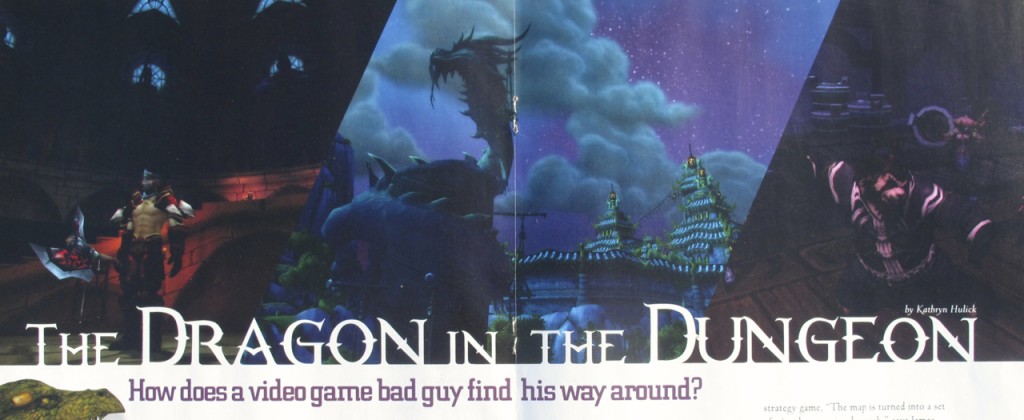“So, how do you feel about writing an article about video games?” asked the editor of Odyssey magazine. The theme of the issue, which came out for November/December 2012, is “Lost” – how we find out way around in space. They had plenty of articles on real space, and wanted one on virtual space.
I’ve been writing for the magazine for over five years now, and usually when I get this question, the topic is something I know next to nothing about. Zebras. The inside of the sun. Bacteria. But this time was different. Not only do I love playing video games, but I’m married to a programmer who worked for years on artificial intelligence in games.
Steve is very smart, and patient, too. We’ve had hour-long conversations where he explains to me the function of something like a behavior tree (a way to organize and dictate the behaviors of non-player characters in a game).
When I got the opportunity to write about space in video games, I knew exactly where to start: pathfinding. I didn’t know much about how it worked, though. Steve, the perfect research partner for this project, handed me the book “Programming Game AI by Example,” and then reached out to some of his colleagues – including a person he’d met at a conference five years back – to get me an interview at Blizzard, home of StarCraft and World of Warcraft.
Though I know next to nothing about how to write a computer program, I still found the book fascinating. I only had time to read the chapters relevant to my article, but someday I’d like to read the whole thing. Artists start with a blank canvas, but game programmers don’t even have a canvas. Every rule of a world has to be built from scratch – including things like physics and space. They have lots of great tools to help with this, but it’s still a job of mind-boggling complexity.
Of course I interviewed Steve as well — and he read through each draft of the article to make suggestions. It was great fun to collaborate on something like this, and I got a more in-depth look into his world. I consider him the co-writer for this one, and when I get my check, I’ll take him out to dinner!
Here’s Steve’s website for anyone out there who wants to read more about his video game projects.


Hi Kathryn,
Just connected with you on twitter, and you D & D article caught my attention on your wen pages.Thought you might enjoy this about my relative John Eric Holmes. He edited the original rule book for Dungeons and Dragons:
John Eric Holmes M.D. (February 16, 1930 – March 20, 2010)[1] was an associate professor of neurology at the University of Southern California School of Medicine, an author and promoter of fantasy role-playing games, a noted fan and enthusiast of Edgar Rice Burroughs, and an American writer of non-fiction, fantasy and science fiction. His writings appeared under his full name and under variants such as Eric Holmes and J. Eric Holmes.
Thanks for the comment. D & D certainly inspired many fantasy role-playing video games.